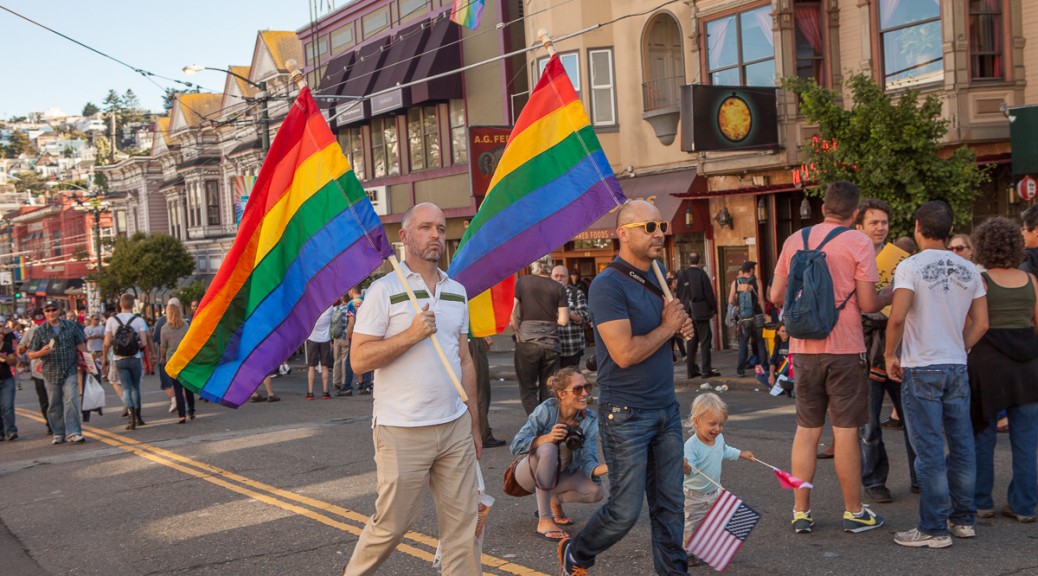[Image: Two men walk side by side carrying rainbow flags along a crowded Castro Street in San Francisco.]
Last week I posted some thoughts on marriage equality, as I was concerned by commentary I’d read that the legalization of same-sex marriage primarily benefits white cis gay men. While I still don’t believe that to be true, an article published today, “Will Gay Identity Really Disappear Now That We Have Marriage Equality?“, both infuriated me and shed more light on this issue.
This article contains quotes from other authors such as “What do gay men have in common when they don’t have oppression?” and “There is something wonderful about being part of an oppressed community.” The author also opines that “Justice Anthony Kennedy’s opinion makes it clear once and for all that we are equal members of society.” He wonders, “Outside of the bedroom, will being gay become more like an ethnic identity?”
These statements are troubling on many levels. First of all, this whole discussion is centering gay men in an issue that affects people of many genders and orientations. As I pointed out in my earlier piece, it’s not “gay marriage” that was won, it’s marriage equality. This includes not only gays but lesbians, bisexuals, pansexuals, asexuals, queer and trans people, all of whom may be in same-sex partnerships.
Second, the Obergefell v. Hodges decision in no way makes gay men “equal members of society”. Maybe a white, cisgender, able-bodied gay man who is “raising kids, caring for elderly parents, living in the (gasp) ‘burbs, working in office cubicles,” can believe that he is equal to his straight counterparts. That is , if he’s lucky to live in a city that bans housing and employment discrimination based on sexual orientation. The article does touch on this, but vastly underestimates the distance we have left to go, saying “it seems like the final chapter is being written.”
There’s also some pretty disgusting nationalism in the article, saying the marriage equality ruling puts America decades or centuries ahead of the rest of the world “with the exception of Europe,” and hoping that Americans will use social media to “help outcasts everywhere.” Marriage equality or not, I know that I’m sure not feeling patriotic about being a US-American right now.
The notion of nostalgia for that “wonderful” time when all gays could unite based on a common oppressed identity is frankly appalling to me. There is nothing “wonderful” about being seen as a pervert, a molester, a person who is less than human. As I lived up until recently as a woman and have always had relationships primarily with men, I’ve been fortunate to avoid homo-antagonism directed at me personally. But once I am read consistently as male, there will be places where it is unsafe to walk hand-in-hand with my spouse. The fact that our marriage is now legal everywhere in the US is irrelevant to someone who thinks that homosexuality is a mental illness, a crime against nature, or a perversion of God’s will. (Nevermind the fact that neither of us is actually homosexual; I’m queer and my spouse is bi.)
Perhaps I would feel differently if I were a gay cis man who was active in the movement in earlier decades. But I can’t imagine that many black people who were active in the civil rights movement in the 60s are now deciding that there’s no point in having a black identity. The Black Lives Matter movement has shown that racism is still thriving, despite blacks supposedly being legally equal to whites. And being black in the US is more than being oppressed; it is a culture, an identity of its own.
On being gay possibly evolving into an “ethnic identity”, as the author suggests, that sounds suspiciously like the whole Rachel Dolezal mess. Yes, sexual orientation is separate from gender identity (gender identity being the purported issue in comparing Dolezal to Caitlyn Jenner), though the two are often confused. But neither of these is an ethnicity, nor a race (terms that are also often confused).
So what do gay men have in common, besides oppression? What is the “gay identity”? I can’t tell you. Despite being legally male and married to a man, I’m not gay. I thought I might be a gay man when I was in early transition, but I realized that I’m not; I’m queer and agender. I personally struggle to fit into any culture revolving around gender identity or sexual orientation (or ethnicity for that matter).
But these cultures absolutely do exist, and will continue to exist for a long time. And so will oppression. Erasing identity is itself oppressive. Assimilation is not the answer to ending heterosexism. Marriage equality was a necessary, but not by any means sufficient, part of gaining full equality for all.

I’ve got a petition out to try to change the issue with discrimination. Found here.
Yay, the first non-spam comment on my new blog! Thanks and signed. 🙂